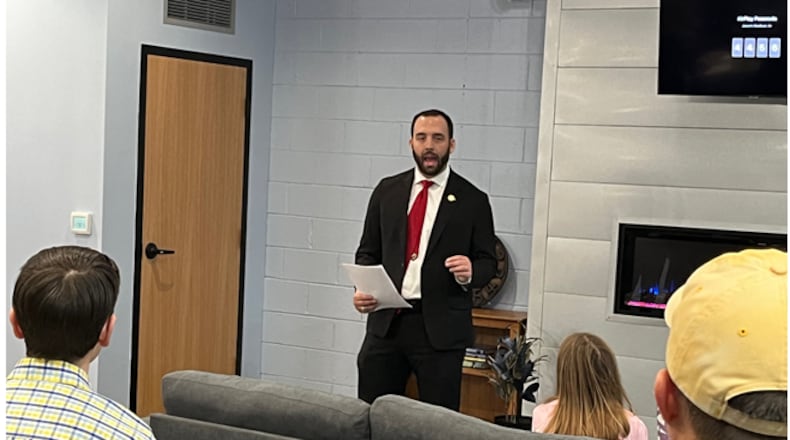Mathews, along with state Rep. Brian Lampton, R-Beavercreek; and state Sens. George Lang, R-West Chester; and Steve Huffman, R-Tipp City, presented two plans to begin the phase-out of Ohio’s individual income tax to zero over six years that would eliminate this $10 billion income source of income to the state — about a quarter of Ohio’s general revenue. The proposal would also eliminate the state’s Commercial Activity Tax.
Each plan, if enacted in 2024, would shrink income tax year-by-year until it’s down to zero by 2030. Each plan would also whittle down the tax rate for the wealthiest Ohioans earning over $100,000 a year more quickly than it would reduce the rate for Ohioans earning between $26,001 to $100,000. The plans differ in their rate of reduction.
But underlying their plan is the belief that levying fewer taxes increases the tax base. In this instance, eliminating the income tax could be seen as a way to spur economic activity or entice more businesses to move to Ohio, similar to what has been done in the states of Florida, Texas and Tennessee.
“Nine states have no income taxes,” Mathews said. “We want families and businesses to come and grow here.”
However, Mathews and the other lawmakers offered no concrete solutions to how the state would make up for all the lost revenue. And that is what raised skepticism among people at the town hall who like the idea of no state income tax.
Mason Councilwoman Joy Bennett said there are still a lot of gaps to fill in and she certainly likes the sound of economic activity bringing in more revenue.
“I’m wondering what other factors aren’t being considered,” she said.
Fred Cramer, a Sugarcreek Twp. trustee, said “the concept plan is awesome but the state will have to make up $8 billion to $14 billion. But you can’t do a ‘shell game.’”
Cramer said there “was no meat behind it and no real plan. It’s exciting but they have to do more homework.”
Frank Wright of Lebanon said he loves the idea looking at it from a high level. “The devil is in the details. What are the projections?
Wright agrees that less taxes would spur more economic development. He said the general population trend is moving southward and is climate related as well as having more agreeable tax structures.
“The concept has merit but how do you make up the shortfall? How much in other taxes? How much economic activity is needed and can there be a reduction in state spending?
Christy Bessey of Lebanon likes the idea and believes it’s “long overdue.”
“I think Ohio has a lot to offer,” she said. “I do see promise in it and it could be a big incentive to move to Ohio.”
Diana Telles of West Chester said she likes Mathews proposal to seek limited government and more fiscal responsibility.
“I want to see Ohio move forward,” she said. “I think it’s a good sign to see a member of the Ohio House look farther than his current election cycle. I would jump on this tomorrow. Who would be against a tax cut and releasing business from governmental regulations and taxes? I’m getting tired of waiting for change as a lot of states are doing it. I appreciate his aggressiveness.”
Steve Jones of Mason said he can only give “tepid support of a bill that doesn’t have the full details.”
“I appreciate the desire to work gradually on this and to reduce spending,” Jones said. “But I prefer to read a bill when it’s introduced to understand it before I endorse something.”
About the Author

